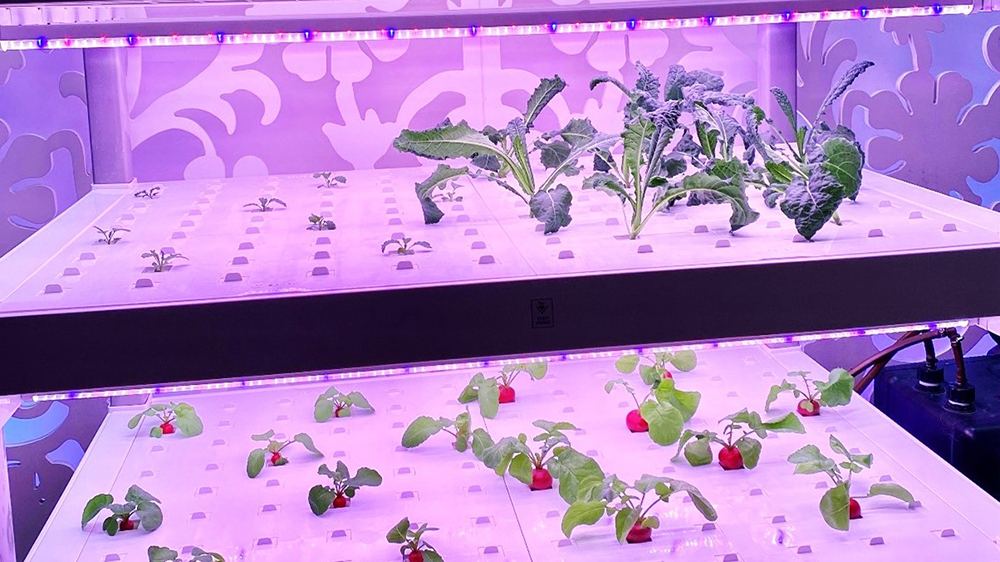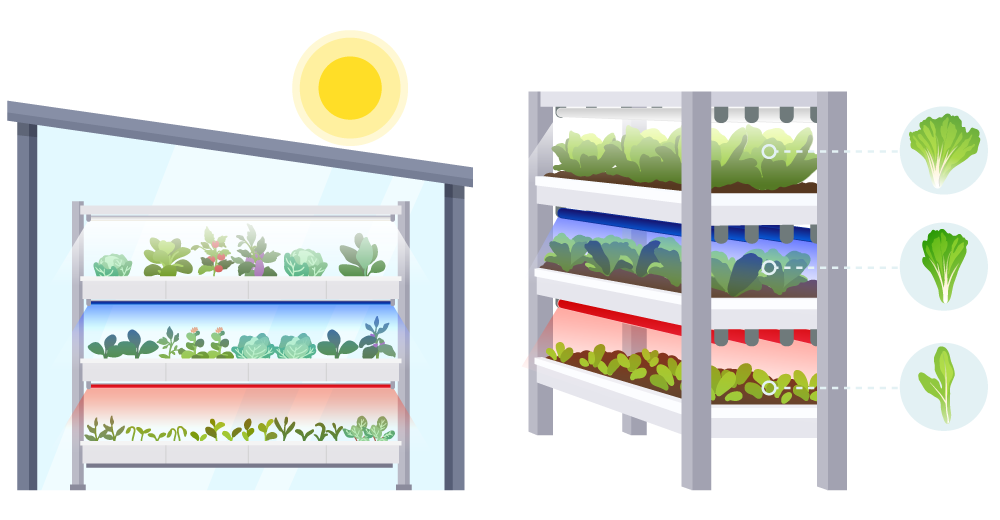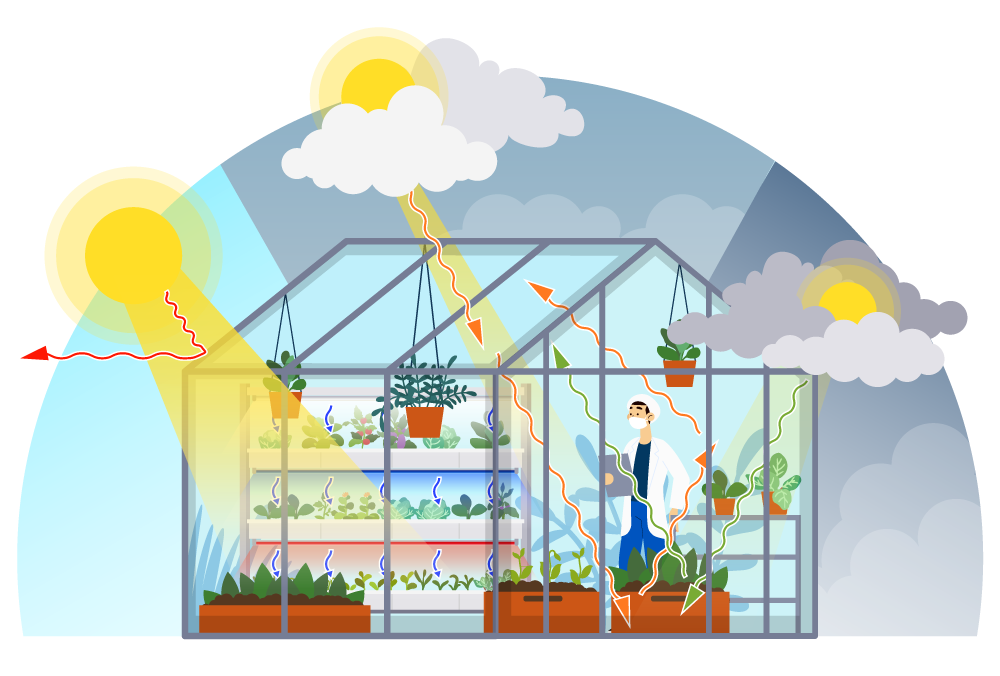A*STAR NEWS
Sustainable Urban Farming - Lighting Up Our Local Farms
A*STAR's innovations in hybrid lighting technologies will create farming environments where vegetables can be produced sustainably and cost effectively.

Indoor farming has gained traction in highly urbanised countries such as Singapore. Crops can be grown in dense, vertically stacked layers.
The Future of Farming
By 2050, the world will need to feed an estimated 9 billion people and the demand for food will be 60 per cent greater than it is today1. Meanwhile, traditional farming methods are plagued by rising temperatures, frequent droughts and less predictable rain caused by global warming, rendering their output increasingly inefficient and unpredictable. These worrying trends have prompted the search for more sustainable and efficient methods of farming.
Indoor farming has gained traction in recent years, particularly in highly urbanised countries such as Singapore. Crops can be grown in dense, vertically stacked layers, which is a significant advantage in land-scarce areas. Additionally, growing conditions can be better managed - crops are protected from adverse weather, and the ability to regulate lighting, temperature, humidity, and other conditions can positively impact crop yield and quality. In a similar vein, greenhouses enable crops to be grown in a more controlled environment.
Modern farms also adopt agriculture technology (agritech to improve farming outcomes. These include increased production yield, better quality produce, and sustainability in the agri-food ecosystem. In Singapore, a nationwide "30 by 30" initiative, the goal to produce 30 per cent of our nation's nutritional needs locally by 2030 to strengthen our food security, has sparked intensive research and development in agritech.
To support this goal, A*STAR’s Agritech & Aquaculture Horizontal Technology Coordinating Office (A2 HTCO) is championing efforts to bring cutting edge technologies to our farms. A multi-disciplinary approach that draws on A*STAR's wide-ranging expertise, from biology and life sciences to robotics and automation, enables us to develop innovative solutions that address key problem statements in agritech. One of our latest projects features research in sustainable hybrid lighting systems. We find out how innovations in lighting technologies create an environment where vegetables can be produced with higher yields, reduced energy consumption and lowered carbon footprint.

The hybrid lighting system maximises crop growth by customising and finetuning light wavelengths (blue, red, white) to achieve optimal photosynthesis rates.
Sustainable Hybrid Lighting Technology
This technology optimises the use of both natural (sun) and artificial lighting (LED) to improve crop yield and reduce energy consumption in greenhouses and vertical indoor farms.
The project targets to achieve ambitious energy savings of up to 80 per cent and improve crop yield by tackling key challenges faced by local farms:
Land constraints
In land-scarce Singapore, indoor vertical farms are under pressure to produce more agricultural output per unit of land area. The hybrid lighting system can increase lighting coverage in vertically stacked farms - adding an additional layer means an additional 100% of crops that can be grown within the same area. The hybrid lighting system is also able to maximise crop growth by customising and finetuning light wavelengths to achieve optimal photosynthesis rates. For both beginner and experienced farmers, being able to simulate and model crop growth with respect to the light spectrum is especially useful when trying new types of crop or for improving the yield of existing crops.
High consumption of energy
Indoor farms consume a high amount of energy; this is not only costly, it is also damaging to the environment. Up to 70 per cent of electricity is used in indoor farms to power artificial lighting. Innovation in LED lighting, which uses at least 75 per cent less energy and lasts 25 times longer than incandescent and fluorescent lighting2, has the potential to be a game changer. Using smart learning logics, our proposed hybrid lighting system can pre-calculate and adjust the ratio of natural and artificial lighting required by crops at their current growth stage. Sunlight can be captured using a light collector and redirected to crop growth areas, reducing the amount and duration of LED lighting required. The system also considers the heat generated by the drivers of LED lighting and excess heat is dissipated/removed with an integrated cooling platform. Overall, less energy is wasted in powering the LEDs panels and this results also in energy consumption savings in the air-conditioning system.
Tropical climate hinders crop growth
Crops that do not receive enough light take a longer time to reach mature stage. In tropical Singapore, we experience cloudiness and rain for at least a third of the year, which can affect crop production. The hybrid lighting system can increase lighting coverage as and when required to promote crop growth.
The lighting system is in the development stage and we expect the working prototype to be ready in late 2021. The programme is hosted by Institute of Material Research and Engineering (IMRE) and co-lead by Institute of High Performance Computing (IHPC), Singapore Institute of Manufacturing Technology (SIMTech), National University of Singapore, Temasek Life Sciences Laboratory and Nanyang Technological University.

The hybrid lighting system maximises crop growth by customising and finetuning light wavelengths (blue, red, white) to achieve optimal photosynthesis rates.
Collaborations with Farms
A2 HTCO, together with our A*STAR scientists, is working closely with local farms to further improve and validate the energy saving hybrid lighting system. The innovations of these research collaborations can be shared with other local players such as the system integrators and start-ups who are keen to bring the solutions into regional markets.
A2 HTCO also engages overseas farm players to set up their R&D and/or production in Singapore. Research collaboration agreements have been inked recently with three companies, &ever Singapore Pte Ltd, LivFresh Pte Ltd and Life3 Agritech Pte Ltd.
&ever is an exciting indoor vertical farming company originating from Germany. They are setting up their Global R&D Centre in Singapore. The research project with the Institute of Material Research and Engineering (IMRE) and Institute of High Performance Computing (IHPC) will look into energy-saving solutions, to further develop a hybrid lighting system for controlled indoor environments.
LivFresh is a local greenhouse farm that uses an advanced, data-driven, climate-controlled facility to grow local greens by applying state-of-the-art hydroponic technology. In September 2020, LivFresh was one of nine companies to receive the 30x30 Express grant, a scheme by the Singapore Food Agency (SFA) to boost local food production. The collaboration with A*STAR Institute of High Performance Computing would enable LivFresh to optimise crop growth via a 'Hybrid Lighting Schedule' system. This system would provide indicators on the use of natural sunlight and LED light to increase the biomass and enhance the crops' visual appearance and texture.
Life3 Agritech is the subsidiary of the local food tech start-up Life3 Biotech. With the support of SFA and SLA, Life3 Biotech is setting up Singapore’s first integrated agri-food pilot facility. Their project collaboration with IMRE is related to tunable lighting solutions for indoor farming. The developed lighting solution aims to improve their productivity in their R&D and farm operation.
Through these collaborations, A2 HTCO plans to improve its research quality and introduce new innovations to the local agritech industry.
1 https://www.weforum.org/agenda/2016/01/food-security-and-why-it-matters/
2 https://www.energy.gov/energysaver/save-electricity-and-fuel/lighting-choices-save-you-money/led-lighting
Was This Article Helpful ?
A*STAR celebrates International Women's Day

From groundbreaking discoveries to cutting-edge research, our researchers are empowering the next generation of female science, technology, engineering and mathematics (STEM) leaders.
Get inspired by our #WomeninSTEM
